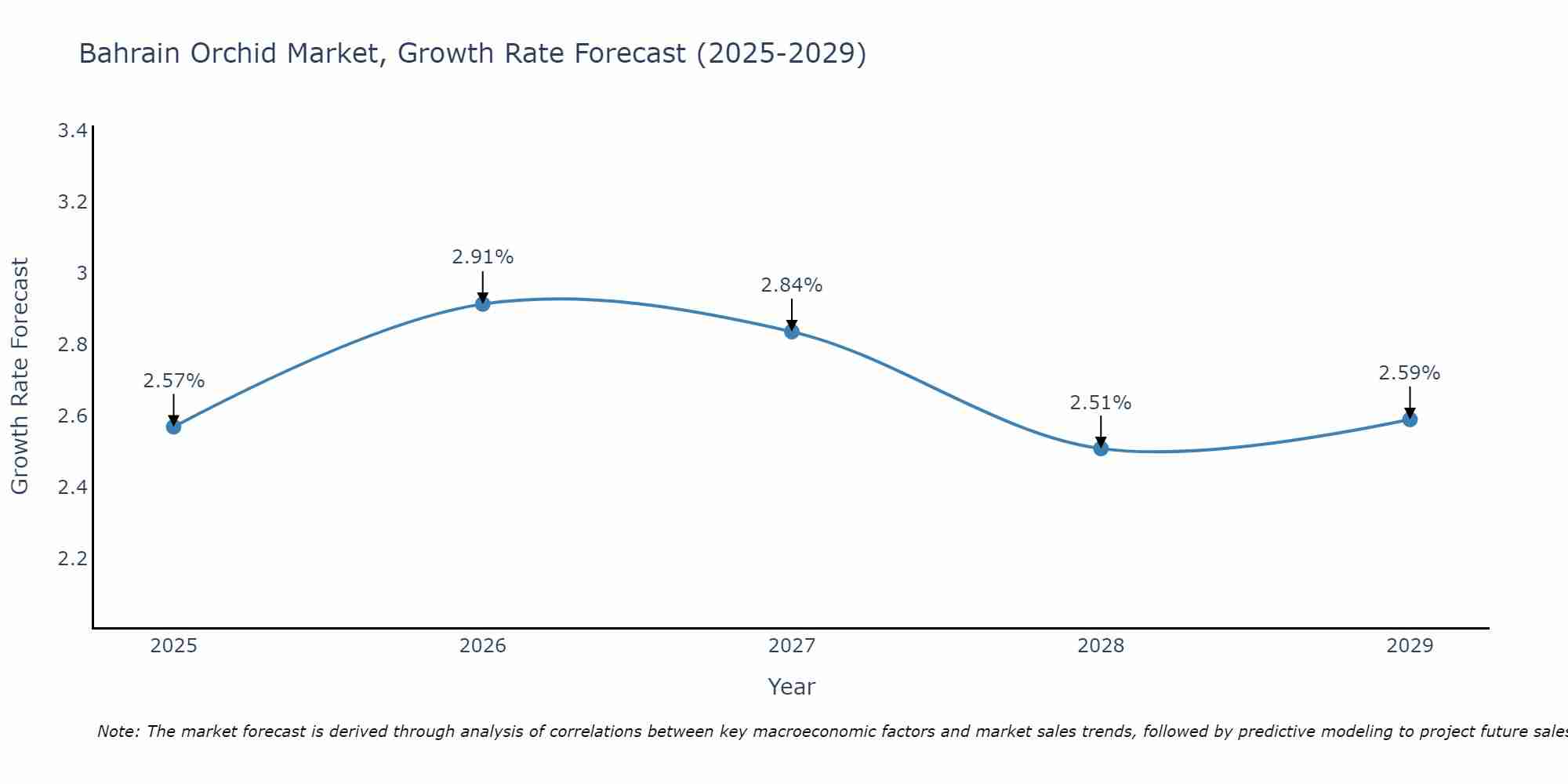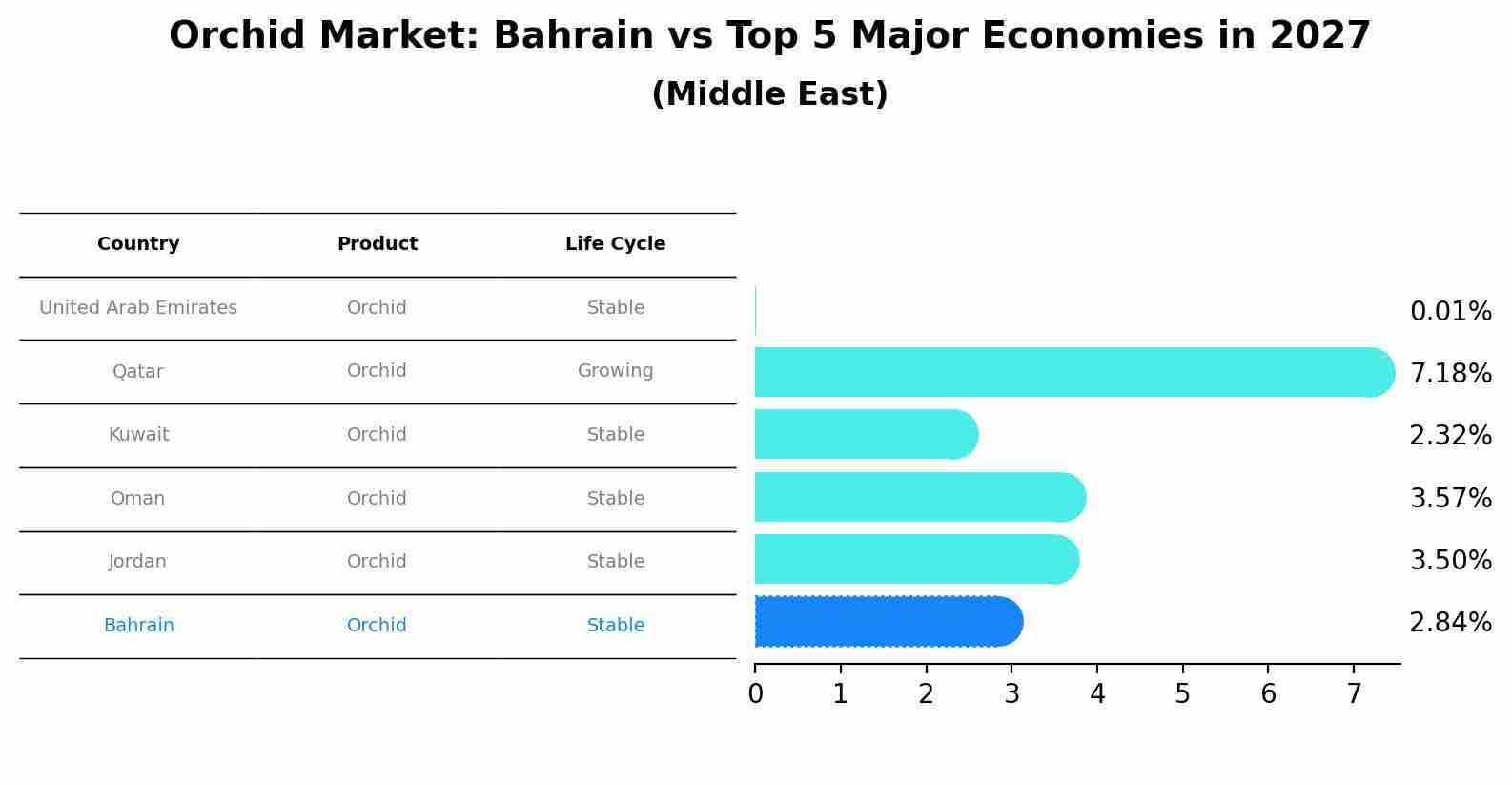Bahrain Orchid Market (2025-2031) Outlook | Companies, Revenue, Growth, Share, Trends, Size, Industry, Analysis, Value & Forecast
| Product Code: ETC383444 | Publication Date: Aug 2022 | Updated Date: Apr 2025 | Product Type: Market Research Report | |
| Publisher: 6Wresearch | Author: Ravi Bhandari | No. of Pages: 75 | No. of Figures: 35 | No. of Tables: 20 |
Bahrain Orchid Market Size Growth Rate
The Bahrain Orchid Market is projected to witness mixed growth rate patterns during 2025 to 2029. Starting at 2.57% in 2025, the market peaks at 2.91% in 2026, and settles at 2.59% by 2029.

Orchid Market: Bahrain vs Top 5 Major Economies in 2027 (Middle East)
By 2027, the Orchid market in Bahrain is anticipated to reach a growth rate of 2.84%, as part of an increasingly competitive Middle East region, where United Arab Emirates remains at the forefront, supported by Qatar, Kuwait, Oman and Jordan, driving innovations and market adoption across sectors.

Bahrain Orchid Market Synopsis
The orchid market in Bahrain caters to a niche but affluent segment that values exotic and decorative flora. Orchids are commonly used in high-end floral arrangements, hotel lobbies, and personal gifting. Due to their delicate nature and high maintenance requirements, most orchids are imported and sold through florists and specialty garden centers. The market thrives on aesthetic appeal and seasonal demand during events and celebrations.
Trends of the market
The nuts market in Bahrain is thriving, supported by a strong snacking culture, gifting traditions, and health trends. Almonds, pistachios, walnuts, and cashews are widely consumed, with both raw and processed forms in demand. Local roasters and importers are capitalizing on the markets growth by offering innovative flavors and packaging.
Challenges of the market
The orchid market in Bahrain is highly niche and limited by the country`s extreme climate, which makes outdoor cultivation nearly impossible. Imported orchids dominate the market, but high costs and short shelf life restrict widespread retail distribution. Specialized care requirements discourage average consumers from purchasing orchids as decorative plants. The luxury positioning of orchids limits demand to a small, high-income segment, often for events or gifting purposes. Moreover, a lack of local floricultural expertise reduces the possibility of domestic orchid breeding. These challenges keep the market constrained despite its exotic appeal.
Investment opportunities in the Market
Orchids are increasingly favored in Bahrains ornamental plant market due to their aesthetic appeal and use in events, home décor, and luxury gifting. Despite climatic challenges, controlled greenhouse cultivation and importation offer promising investment avenues. Entrepreneurs can establish orchid nurseries using hydroponic or climate-controlled methods to ensure year-round production. Retail opportunities span florists, supermarkets, and upscale boutiques, while B2B demand comes from hotels, event planners, and real estate staging companies. Offering unique orchid varieties and custom floral arrangements can position brands in the premium segment. Online flower delivery services could further expand market access and customer engagement.
Government Policy of the market
Bahrains orchid market is regulated by the Ministry of Municipalities and Urban Planning, which ensures that all imported and locally cultivated orchids meet stringent quality standards. The government enforces plant health regulations to prevent the spread of pests and diseases that could harm the local ecosystem. Policies encourage sustainable cultivation methods, such as the use of organic fertilizers and water-efficient farming techniques. There is a growing demand for ornamental plants, including orchids, driven by local and regional markets, and the government has incentivized businesses that focus on innovation in plant breeding. The market also benefits from export opportunities, with policies designed to boost the export of high-quality orchids to neighboring countries. Bahrain`s policies also promote the use of environmentally sustainable packaging and logistics in the orchid supply chain.
Key Highlights of the Report:
- Bahrain Orchid Market Outlook
- Market Size of Bahrain Orchid Market, 2024
- Forecast of Bahrain Orchid Market, 2031
- Historical Data and Forecast of Bahrain Orchid Revenues & Volume for the Period 2021 - 2031
- Bahrain Orchid Market Trend Evolution
- Bahrain Orchid Market Drivers and Challenges
- Bahrain Orchid Price Trends
- Bahrain Orchid Porter's Five Forces
- Bahrain Orchid Industry Life Cycle
- Historical Data and Forecast of Bahrain Orchid Market Revenues & Volume By Product Type for the Period 2021 - 2031
- Historical Data and Forecast of Bahrain Orchid Market Revenues & Volume By Phalaenopsis Orchid for the Period 2021 - 2031
- Historical Data and Forecast of Bahrain Orchid Market Revenues & Volume By Cattleya Orchid for the Period 2021 - 2031
- Historical Data and Forecast of Bahrain Orchid Market Revenues & Volume By Vanda Orchid for the Period 2021 - 2031
- Historical Data and Forecast of Bahrain Orchid Market Revenues & Volume By Paphiopedilum Orchid for the Period 2021 - 2031
- Historical Data and Forecast of Bahrain Orchid Market Revenues & Volume By Miltonia Orchid for the Period 2021 - 2031
- Historical Data and Forecast of Bahrain Orchid Market Revenues & Volume By Others for the Period 2021 - 2031
- Historical Data and Forecast of Bahrain Orchid Market Revenues & Volume By Application for the Period 2021 - 2031
- Historical Data and Forecast of Bahrain Orchid Market Revenues & Volume By Garden for the Period 2021 - 2031
- Historical Data and Forecast of Bahrain Orchid Market Revenues & Volume By Cosmetic for the Period 2021 - 2031
- Historical Data and Forecast of Bahrain Orchid Market Revenues & Volume By Herbal Medicine for the Period 2021 - 2031
- Bahrain Orchid Import Export Trade Statistics
- Market Opportunity Assessment By Product Type
- Market Opportunity Assessment By Application
- Bahrain Orchid Top Companies Market Share
- Bahrain Orchid Competitive Benchmarking By Technical and Operational Parameters
- Bahrain Orchid Company Profiles
- Bahrain Orchid Key Strategic Recommendations
Frequently Asked Questions About the Market Study (FAQs):
- Single User License$ 1,995
- Department License$ 2,400
- Site License$ 3,120
- Global License$ 3,795
Search
Thought Leadership and Analyst Meet
Our Clients
Related Reports
- Afghanistan Rocking Chairs And Adirondack Chairs Market (2026-2032) | Size & Revenue, Competitive Landscape, Share, Segmentation, Industry, Value, Outlook, Analysis, Trends, Growth, Forecast, Companies
- Afghanistan Apparel Market (2026-2032) | Growth, Outlook, Industry, Segmentation, Forecast, Size, Companies, Trends, Value, Share, Analysis & Revenue
- Canada Oil and Gas Market (2026-2032) | Share, Segmentation, Value, Industry, Trends, Forecast, Analysis, Size & Revenue, Growth, Competitive Landscape, Outlook, Companies
- Germany Breakfast Food Market (2026-2032) | Industry, Share, Growth, Size, Companies, Value, Analysis, Revenue, Trends, Forecast & Outlook
- Australia Briquette Market (2025-2031) | Growth, Size, Revenue, Forecast, Analysis, Trends, Value, Share, Industry & Companies
- Vietnam System Integrator Market (2025-2031) | Size, Companies, Analysis, Industry, Value, Forecast, Growth, Trends, Revenue & Share
- ASEAN and Thailand Brain Health Supplements Market (2025-2031) | Strategy, Consumer Insights, Analysis, Investment Trends, Opportunities, Growth, Size, Share, Industry, Revenue, Segments, Value, Segmentation, Supply, Forecast, Restraints, Outlook, Competition, Drivers, Trends, Demand, Pricing Analysis, Competitive, Strategic Insights, Companies, Challenges
- ASEAN Bearings Market (2025-2031) | Strategy, Consumer Insights, Analysis, Investment Trends, Opportunities, Growth, Size, Share, Industry, Revenue, Segments, Value, Segmentation, Supply, Forecast, Restraints, Outlook, Competition, Drivers, Trends, Demand, Pricing Analysis, Competitive, Strategic Insights, Companies, Challenges
- Europe Flooring Market (2025-2031) | Outlook, Share, Industry, Trends, Forecast, Companies, Revenue, Size, Analysis, Growth & Value
- Saudi Arabia Manlift Market (2025-2031) | Outlook, Size, Growth, Trends, Companies, Industry, Revenue, Value, Share, Forecast & Analysis
Industry Events and Analyst Meet
Whitepaper
- Middle East & Africa Commercial Security Market Click here to view more.
- Middle East & Africa Fire Safety Systems & Equipment Market Click here to view more.
- GCC Drone Market Click here to view more.
- Middle East Lighting Fixture Market Click here to view more.
- GCC Physical & Perimeter Security Market Click here to view more.
6WResearch In News
- Doha a strategic location for EV manufacturing hub: IPA Qatar
- Demand for luxury TVs surging in the GCC, says Samsung
- Empowering Growth: The Thriving Journey of Bangladesh’s Cable Industry
- Demand for luxury TVs surging in the GCC, says Samsung
- Video call with a traditional healer? Once unthinkable, it’s now common in South Africa
- Intelligent Buildings To Smooth GCC’s Path To Net Zero


















